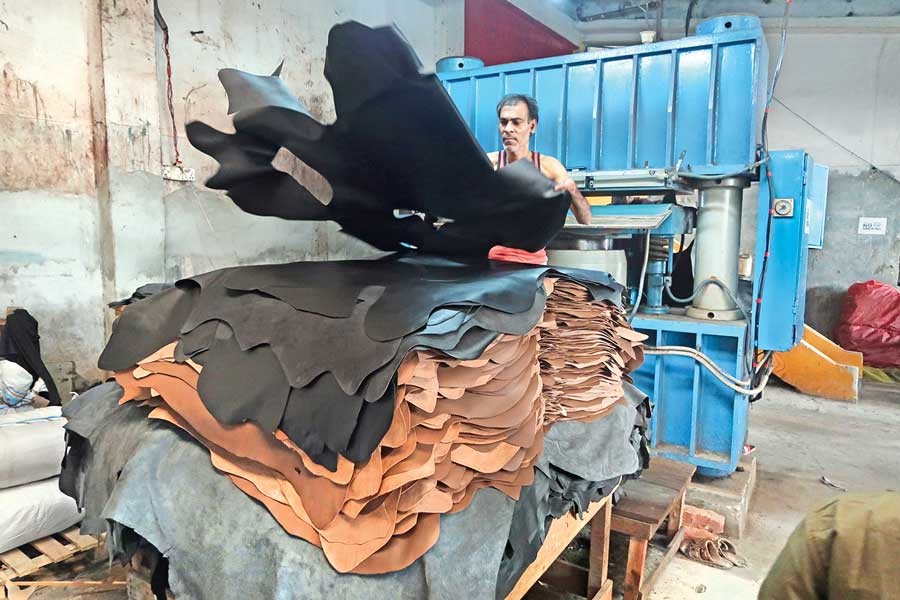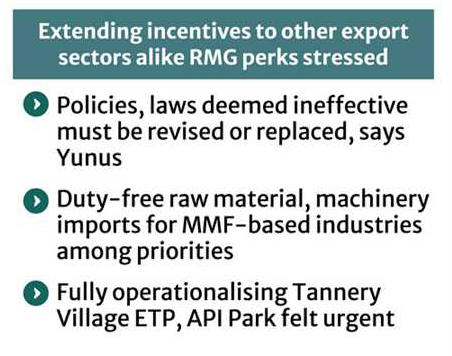LDC graduation meet sets economic priorities
CA orders immediate upgrading of leather sector for export diversification

Published :
Updated :

Chief Adviser Prof Muhammad Yunus emphasised upgrading leather sector to accelerate export diversification and directed officials to heal the challenges facing the "potential" industry.
His directions came Wednesday at a high-level review meeting on Bangladesh's preparations for graduation from the least- developed country (LDC) status, which took stock of the entire gamut of policies, priorities and reforms concerning economy, trade, tariff and dos to fit in evolving global order.

"We have committed a serious oversight regarding our leather industry. We have failed to realise its true potential. This sector should have been a major economic contributor, but it has not yielded the expected results," the head of post-uprising government told the meeting, held at his office in Tejgaon.
The meeting specifically did a stocktaking of progress on 16 key decisions related to the transition process. Four of the tasks are being implemented by the National Board of Revenue (NBR), three by the Ministry of Industries, two by the Economic Relations Division, three by the Ministry of Commerce, and four by the Office of the Chief Adviser.
Chairman of the NBR Md. Abdur Rahman Khan informed the meeting that the board is actively working towards full implementation of the National Single Window platform. So far, 19 government agencies have been integrated, with more in the process of inclusion, said a spokesperson for the CA Office.
He also updated the Chief Adviser on the progress on the action plan to implement the Tariff Policy 2023, now that tariffs have created turmoil in global trade.
A key part of the deliberations focused on extending support and incentives to other export sectors similar to those received by the readymade garment (RMG) industry.
The meeting explored options for duty-free import of raw materials and machinery for manmade fibre-based industries to ensure competitiveness in a post-LDC scenario in global trade regime.
The meeting also assessed the current status of industrial infrastructure in the country, highlighting the need to fully operationalise the Effluent Treatment Plant (ETP) in Savar's Tannery Village and the Active Pharmaceutical Ingredient (API) Park in Gazaria, Munshiganj.
Additionally, participants reviewed updates on the Industrial Policy 2022, particularly regarding measures taken for its revision.
Dr Yunus also directed a follow-up meeting to be held within two months to assess progress and lay out actionable strategies for graduating out of the world's poor-country club.
Reiterating the urgency of reform, Yunus said, "We must act in our own interest, for the sake of our economy. Policies and laws that are ineffective must be revised or replaced. These are fundamental issues. If we want to graduate successfully, we must address them head-on."
Among the attendees at the meeting were also Finance Adviser Dr Salehuddin Ahmed, Industry Adviser Adilur Rahman Khan, Environment Adviser Syeda Rizwana Hasan, Shipping Adviser M. Sakhawat Hossain and Health Adviser Nurjahan Begum, Cabinet Secretary Sheikh Abdur Rashid, Principal Secretary to the Chief Adviser M. Siraj Uddin Miah, Bangladesh Bank Governor Ahsan H. Mansur, along with secretaries from various ministries.
Discussions underscored the multidimensional nature of LDC- graduation process, involving not only economic readiness but also institutional reform and export diversification.
The commitment from the highest levels of the interim government reflects an urgency to ensure that Bangladesh's LDC graduation in 2026 be both smooth sailing and sustainable.
"With significant groundwork already in place and tangible steps underway, the review meeting signals that Bangladesh is preparing to turn a critical developmental milestone into an opportunity for long-term economic transformation," said the CAO spokesperson.
mirmostafiz@yahoo.com


 For all latest news, follow The Financial Express Google News channel.
For all latest news, follow The Financial Express Google News channel.